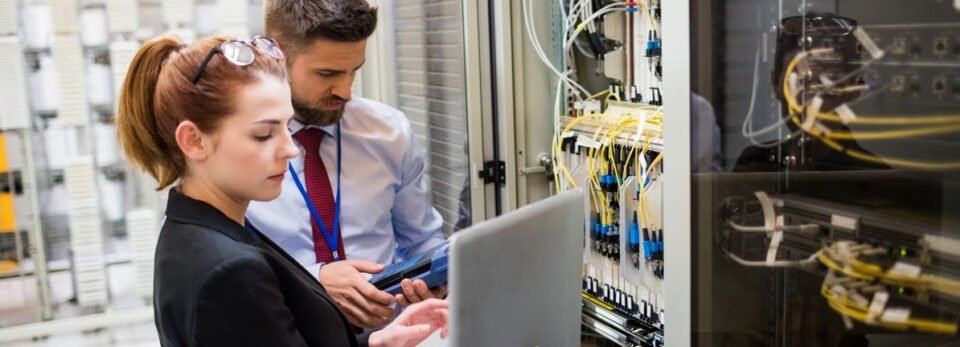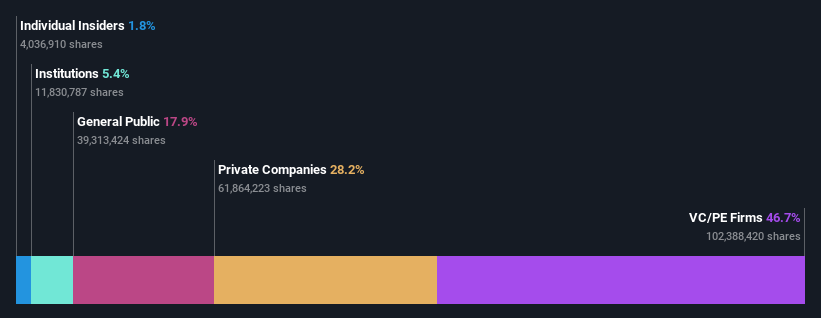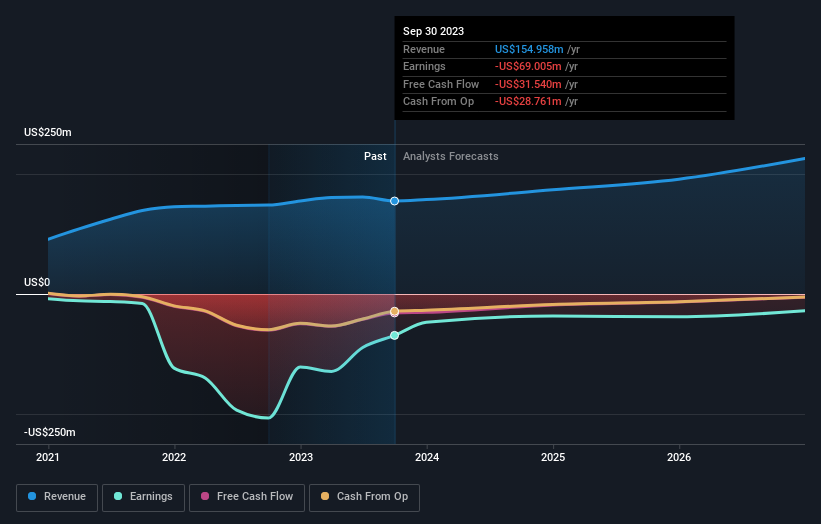Key Insights
-
Significant control over BigBear.ai Holdings by private equity firms implies that the general public has more power to influence management and governance-related decisions
-
The top 2 shareholders own 75% of the company
If you want to know who really controls BigBear.ai Holdings, Inc. (NYSE:BBAI), then you’ll have to look at the makeup of its share registry. We can see that private equity firms own the lion’s share in the company with 47% ownership. That is, the group stands to benefit the most if the stock rises (or lose the most if there is a downturn).
As a result, private equity firms were the biggest beneficiaries of last week’s 22% gain.
Let’s take a closer look to see what the different types of shareholders can tell us about BigBear.ai Holdings.
View our latest analysis for BigBear.ai Holdings
What Does The Institutional Ownership Tell Us About BigBear.ai Holdings?
Many institutions measure their performance against an index that approximates the local market. So they usually pay more attention to companies that are included in major indices.
BigBear.ai Holdings already has institutions on the share registry. Indeed, they own a respectable stake in the company. This implies the analysts working for those institutions have looked at the stock and they like it. But just like anyone else, they could be wrong. When multiple institutions own a stock, there’s always a risk that they are in a ‘crowded trade’. When such a trade goes wrong, multiple parties may compete to sell stock fast. This risk is higher in a company without a history of growth. You can see BigBear.ai Holdings’ historic earnings and revenue below, but keep in mind there’s always more to the story.
We note that hedge funds don’t have a meaningful investment in BigBear.ai Holdings. Looking at our data, we can see that the largest shareholder is AE Industrial Partners, LP with 47% of shares outstanding. Pangiam Ultimate Holdings, LLC is the second largest shareholder owning 28% of common stock, and BlackRock, Inc. holds about 1.3% of the company stock.
To make our study more interesting, we found that the top 2 shareholders have a majority ownership in the company, meaning that they are powerful enough to influence the decisions of the company.
While studying institutional ownership for a company can add value to your research, it is also a good practice to research analyst recommendations to get a deeper understand of a stock’s expected performance. There are plenty of analysts covering the stock, so it might be worth seeing what they are forecasting, too.
Insider Ownership Of BigBear.ai Holdings
The definition of an insider can differ slightly between different countries, but members of the board of directors always count. Management ultimately answers to the board. However, it is not uncommon for managers to be executive board members, especially if they are a founder or the CEO.
Insider ownership is positive when it signals leadership are thinking like the true owners of the company. However, high insider ownership can also give immense power to a small group within the company. This can be negative in some circumstances.
Our most recent data indicates that insiders own some shares in BigBear.ai Holdings, Inc.. As individuals, the insiders collectively own US$15m worth of the US$823m company. Some would say this shows alignment of interests between shareholders and the board. But it might be worth checking if those insiders have been selling.
General Public Ownership
With a 18% ownership, the general public, mostly comprising of individual investors, have some degree of sway over BigBear.ai Holdings. While this size of ownership may not be enough to sway a policy decision in their favour, they can still make a collective impact on company policies.
Private Equity Ownership
With a stake of 47%, private equity firms could influence the BigBear.ai Holdings board. Some might like this, because private equity are sometimes activists who hold management accountable. But other times, private equity is selling out, having taking the company public.
Private Company Ownership
It seems that Private Companies own 28%, of the BigBear.ai Holdings stock. It’s hard to draw any conclusions from this fact alone, so its worth looking into who owns those private companies. Sometimes insiders or other related parties have an interest in shares in a public company through a separate private company.
Next Steps:
I find it very interesting to look at who exactly owns a company. But to truly gain insight, we need to consider other information, too. Be aware that BigBear.ai Holdings is showing 5 warning signs in our investment analysis , and 2 of those are potentially serious…
If you would prefer discover what analysts are predicting in terms of future growth, do not miss this free report on analyst forecasts.
NB: Figures in this article are calculated using data from the last twelve months, which refer to the 12-month period ending on the last date of the month the financial statement is dated. This may not be consistent with full year annual report figures.
Have feedback on this article? Concerned about the content? Get in touch with us directly. Alternatively, email editorial-team (at) simplywallst.com.
This article by Simply Wall St is general in nature. We provide commentary based on historical data and analyst forecasts only using an unbiased methodology and our articles are not intended to be financial advice. It does not constitute a recommendation to buy or sell any stock, and does not take account of your objectives, or your financial situation. We aim to bring you long-term focused analysis driven by fundamental data. Note that our analysis may not factor in the latest price-sensitive company announcements or qualitative material. Simply Wall St has no position in any stocks mentioned.



